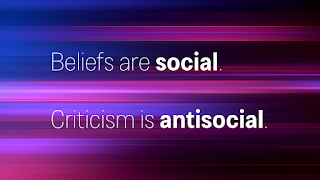Yesterday, Dr. Anthony Fauci said:
One of the problems we face in the United States is that unfortunately, there is a combination of an anti-science bias that people are—for reasons that sometimes are, you know, inconceivable and not understandable—they just don’t believe science.
Fauci is operating in a political environment, so I think he is reluctant to list the many reasons we know why people don’t believe science.
People don’t believe in the science of evolution because of religions.
People don’t believe in global warming / climate change because of a misinformation campaign prompted by fear of communism.
People don’t believe the Earth is spherical because they watch a lot of YouTube videos.
People don’t believe in COVID-19 because of Fox News and the current US president.
But all of these examples boil down to social influence – or, to put it another way, peer pressure. Humans are social animals. We pay a lot of attention to what other people think, say, and do.
In the information / belief / influence ecosystem, professional science is relatively new (maybe a few hundred years compared to thousands of years for some religions), relatively small (Rupert Murdoch’s wealth, ~US$17.3 billion, exceeds the entire annual budget of the National Science Foundation, currently ~US$7.8 billion), and disorganized as shit (“committees top to bottom”).
We’re lucky that science gets things done. Because of that, we are sometimes able to overcome those disadvantages and punch above our weight. Honestly, it’s sometimes surprising that science has as much sway as it does.
Science is not a natural, intuitive way of thinking. There’s a reason the training for scientists goes on for so long. It doesn’t take a long time just because you have to learn a lot of facts, it takes a long time because you have to practice the patterns of thinking so that they become habitual. (“What are the alternative explanations? Does this prediction really flow from that hypothesis? And what do those error bars show, anyway?”)
All of the above (most of which I tweeted earlier) got me thinking about how one of the keys of science’s success, the reason we punch above our weight, is that science institutionalized and valued behaviour that is kind of anti-social.
Criticism.
Because we are social animals, we do not like criticism. We feel attacked. We get defensive. We try to shut it down all the time. (In my many years of blogging, the only times I got aggressive emails about posts were from professors who didn’t like that I was commenting on student posters. It wasn’t even criticism of them.)
Science normalizes criticism in a way that a lot of other institutions don’t. A lot of institutions place a lot of value on reinforcing their existing beliefs. There may be traditions of criticism and examination within that, but there are usually some lines that you don’t cross if you want to stay part of that community.
Author David Brin like to say, “Criticism is the only known antidote to error.” I think there’s a lot of truth to that. We have to recognize how fundamental its role in science is.
And, as I said above, we have to recognize that learning how to deliver and take criticism without destroying the social glue that allows the scientific community to function is not a natural, normal thing to do. It is something that you need to learn, a habit you need to develop, and a skill you need to practice and improve.
External links


No comments:
Post a Comment